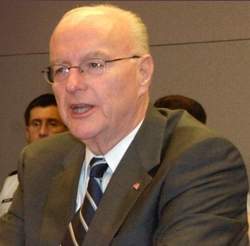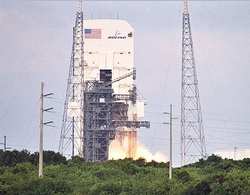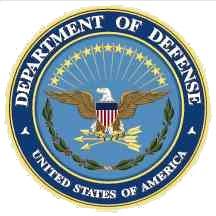Teets: "Space Assets More Important To Warfighters Than
Ever"
America needs a roadmap to ensure future success, the Defense
Department's executive agent for space said earlier this week.
 Peter B. Teets, undersecretary of the Air Force
and director of the National Reconnaissance Office (right),
discussed the country's top national security space priorities at a
media roundtable conference at the NRO headquarters here.
Peter B. Teets, undersecretary of the Air Force
and director of the National Reconnaissance Office (right),
discussed the country's top national security space priorities at a
media roundtable conference at the NRO headquarters here.
"Any discussion of priorities needs to start with the notion of
ensuring mission success in space operations," he said. "Our space
assets are now probably more important to warfighters, more
important to our ability to win the global war on terrorism than
they ever have been."
According to Teets, there have already been two successful
national security space launches in 2003, with 12 more scheduled.
There was only one last year.
Therein Lies The Rub
The key to maintaining the schedule, he said, is a viable fleet
of launch vehicles. The United States currently uses the Atlas V
and Delta IV evolved expendable launch vehicles to boost spacecraft
into orbit.

"It's important to have two EELVs ... as independent as possible
so, in the event one of them suffers a launch failure ... (it)
won't bring the ... program to a halt while we get to the root
cause, make the fix and get back into space again," he said.
While the current vehicles are the best the nation has ever had,
Teets said he is looking for better things to come.
"If we're going to have operational, responsive, assured access
to space, we need to (reduce launch preparation) time from weeks
and months down to hours and days," he said.
Smaller, Better, Faster, Cheaper
To accomplish that goal, Teets said he is expecting to see
smaller launch vehicles than can be erected on the launch pad,
bolted to a spacecraft and fueled by a tanker truck.
Other goals on the agenda include developing a cadre of space
professionals, integrating space capabilities for warfighting and
intelligence, getting space acquisition programs back on track and
refocusing on science and technology programs.
"Breakthrough technologies are going to allow us to collect our
adversaries' secrets without their knowing they're being
collected," Teets said. "If we're going to win this global war on
terrorism, we're going to have to get ourselves in position where
we can collect information about (terrorist groups). We need to
find out where they are, what they're thinking (and) what they're
plotting."
Equally important, he said, is enhancing the nation's space
control capability.
"Our space systems give us a very significant capability
advantage," Teets said. "There's no doubt in my mind that our
adversaries have taken note of that, so it's going to be important
for us to put meaningful resources against, first of all, space
situation awareness."

What's Up There?
According to the undersecretary, the first step in defending
America's space assets is knowing more about what else is up
there.
"We track objects, but we don't know an awful lot about what all
those objects may be," he said. "We need to get a better handle on
(that), then we need to implement some defensive measures."
Teets said the first space situational awareness measures would
include attack-warning sensors, but the nation needs to pursue
offensive space capabilities as well.
"The fact is that we're going to want to, if necessary, deny an
adversary their use of space," he said. "Offensive space capability
is something I think we need to start to work on."
 ANN's Daily Aero-Linx (04.16.24)
ANN's Daily Aero-Linx (04.16.24) Aero-News: Quote of the Day (04.16.24)
Aero-News: Quote of the Day (04.16.24) Airborne 04.10.24: SnF24!, A50 Heritage Reveal, HeliCycle!, Montaer MC-01
Airborne 04.10.24: SnF24!, A50 Heritage Reveal, HeliCycle!, Montaer MC-01 Airborne 04.12.24: SnF24!, G100UL Is Here, Holy Micro, Plane Tags
Airborne 04.12.24: SnF24!, G100UL Is Here, Holy Micro, Plane Tags Airborne-Flight Training 04.17.24: Feds Need Controllers, Spirit Delay, Redbird
Airborne-Flight Training 04.17.24: Feds Need Controllers, Spirit Delay, Redbird





